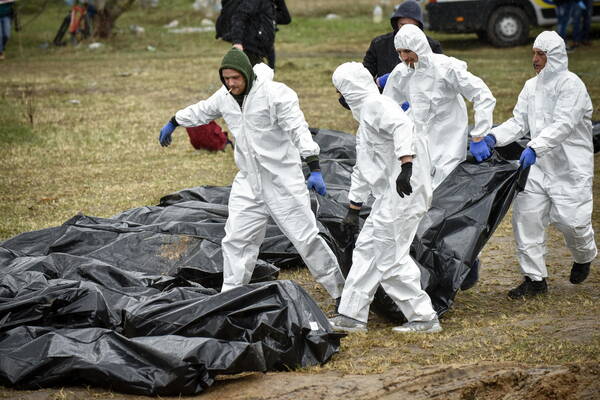War crimes,against humanity, genocide:What's the difference?
ICC opened a probe in Ukraine in March
13 April, 10:57Article 8 also covers deliberate attacks on civilians or "towns, villages, dwellings or buildings which are undefended and which are not military objectives" as well as the "deportation or transfer of all or parts of the population" of an occupied territory. Ukraine's authorities say they have received 5,600 complaints of alleged war crimes by Russian forces since the invasion began on February 24. - What is a crime against humanity? - The notion of such a crime was first laid down on August 8, 1945, and codified in article 7 of the Rome Statute. It involves "a widespread or systematic attack directed against any civilian population" including "murder" and "extermination" as well as "enslavement" and "deportation or forcible transfer". Crimes against humanity can occur in peace-time and include torture, rape and discrimination, be it racial, ethnic, cultural, religious or gender-based. - What is genocide? - Genocide as a legal concept dating back to the Nuremburg trials of Nazi war criminals, with Polish-Jewish lawyer Raphael Lemkin coining the term to describe the Nazi extermination of six million Jews. The crime of genocide was formally created in the Genocide Convention of 1948 to describe "acts committed with intent to destroy, in whole or in part, a national, ethnical, racial or religious group". Genocide is a "very specific international crime" which is difficult to prove, says Cecily Rose, professor of international law at the University of Leiden in the Netherlands, noting that it demands proof of the "mental motivation" behind it. - Newcomer: crime of aggression - The ICC added a crime of aggression to its remit in 2017 to include attacks on "the sovereignty, territorial integrity or political independence" of another country. The offence aims to ensure that political and military leaders are held accountable for invasions, but it cannot be used against the dozens of ICC members that have not recognised the court's jurisdiction for the crime, nor against non-members. Legal experts say bringing such a case against Russia's president may require the establishment of a special tribunal for Ukraine. (ANSA-AFP).














